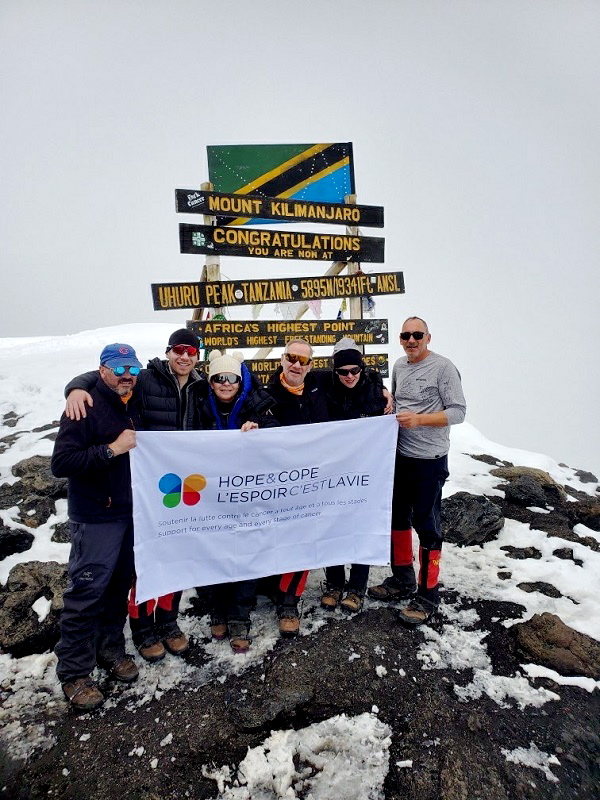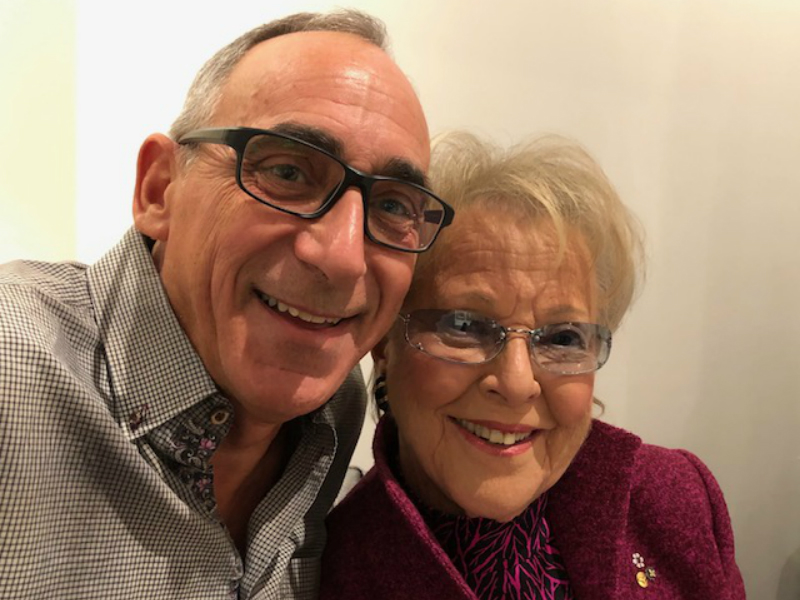When Mark Levitt reached the summit of Mount Kilimanjaro, Africa’s highest peak at 5,895 metres, he took out a tallit and kippah from his knapsack and said Kaddish for his late wife.
The 10th anniversary of Beverly Lecker Levitt’s passing from cancer was a prime motivation for the 61-year-old businessman to take up the challenge of climbing the mountain.
In so doing, he raised close to $120,000 for Hope & Cope, the support program for cancer patients affiliated with the Jewish General Hospital.
Levitt was not a fitness buff when he made the decision to be part of the six-member Hope & Cope team on the climb, which took six days on the ascent, reaching the top on Jan. 27, and two days to get down.
“I like to say that the most climbing I ever did before was climbing into bed at 3 a.m. half-drunk on a semi-weekly basis,” Levitt said.
He got in shape starting 11 weeks before the expedition: he gave up his usual daily half-bottle of wine plus spirits, took spinning classes, often twice daily, and underwent high-altitude training in Florida.
He lost 12 kilograms (26 pounds) in those 11 weeks.
Each participant was required to raise $6,000 for Hope & Cope’s Tell Cancer to Take a Hike campaign, and was responsible for all costs of the trip, including their gear.
At the beginning, Levitt set a goal of $100,000. When he reached that, he went for a symbolic $118,000. At time of writing, he had surpassed that.

Levitt remembers reading about Kilimanjaro, which is in Tanzania, maybe 15 years ago and being fascinated by it. In recent years, he met his girlfriend, Elizabeth Morello, who reached the peak now 31 years ago.
The most recent coincidence was being solicited last year by someone taking part in the campaign’s more modest Kili Chez Nous hikes, held throughout the year in such areas as the Laurentians and Eastern Townships.
Beverly, his wife of 28 years, had been athletic until her untimely passing. Levitt’s adult children urged him on. His parents, both age 94, were a little aghast.
“I knew Hope & Cope was a wonderful organization,” said Levitt, an admirer of its founder in the early 1980s, Sheila Kussner.
Campaign chair Howard Stotland gave the final impetus. He came up with the idea of climbing Kilimanjaro as a Hope & Cope fundraiser.
In 2011, he went up the mountain to benefit for the Montreal Children’s Hospital, an experience he found exhilarating.
“It’s life-changing, the bonding that develops, everyone works together to help each other,” he said.
Terry Soucy led this climb and Hope & Cope’s first Kilimanjaro adventure in March 2018. That team could not reach the summit due to bad weather.
The other team members were the couple Albert Labelle and Chantal Jasmin, their son Maxime Labelle and his girlfriend Véronique Lapointe.
Although the meteorological conditions were more favourable this time, Levitt said this was no walk in the park. At the tropical foot the temperature was over 30 degrees Celsius; at the summit it was minus 20 and snow covered. “We had four seasons in one day,” he said.
Roughing it was a new experience for Levitt, whose family business is industrial shelving. He had never before slept in a tent, let alone gone eight days without a shower or flush toilet.
“It was a question of mind over matter,” he said. “There was too much at stake for me to even think about giving up. It was just not an option.”
Levitt was awed when he went through the opening gate of the trek. “It previously had not really dawned on me that I was actually going to do this.”
When things got tough, he thought, “As with many things in life: you either go forward or go back. If you give a little extra, you can achieve a goal you never thought you could.”
The scenery, of course, was spectacular and everyone became quite emotional when the summit was in sight, he said. “This was what it was all about, you think.
“It was cloudy, we could only make out the sign. But as soon as we got to the top the clouds lifted and the sun came out.”
The first thing he did was open the letter his children had given him to be read at the apex. “It said how proud they are of me and they knew I would succeed.”
After reciting a prayer for his late wife, Levitt took out a necklace that had belonged to her. He had asked his daughter for some personal possession of hers he could leave behind.
“I throw it into the volcano crater, told her I missed her and dearly hoped we would meet again. Then we all celebrated together.”
Stotland said the 2020 Tell Cancer to Take a Hike campaign has raised almost $600,000, surpassing the $550,000 goal.
Hope & Cope, which receives no government funding, relies on private sponsors to continue to provide all services free of charge, many of them at its Wellness Centre. The goal is to enable people to live well at every stage of cancer.







